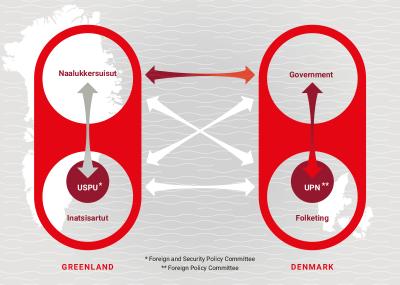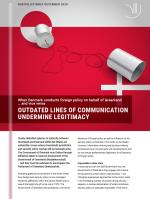Outdated lines of communication undermine legitimacy

Clearly delimited spheres of authority between Greenland and Denmark within the Realm are unfeasible. Issues where Greenlandic jurisdiction and security policy overlap will increasingly arise. The Government of Denmark must follow through initiatives taken to improve involvement of the Government of Greenland (Naalakkersuisut) – and they must be extended to encompass the Parliament of Greenland (Inatsisartut).
Emerging great power dynamics in the Arctic reveal how foreign and security policy is now managed decisively differently within the Danish Realm than it was at the beginning of home rule in 1979. The Government of Greenland has jurisdiction over some elements of foreign policy as well as influence on the security policy conducted in the Arctic by the Realm. However, information-sharing and decision-making procedures have not kept pace with developments and do not ensure parliamentary legitimacy for all aspects of foreign policy.
Impossible to draw a line
In accordance with the Self-Government Act, the Government of Greenland may engage with international partners across rather wide domains – but changing superpower approaches to the Arctic result in an increasing number of issues having security aspects. A precise demarcation of what constitutes security policy is politically impossible: if the line is drawn wide, the autonomy of Greenland will be rolled back while a tightly drawn line is unsustainable within the official constitutional interpretation, which insists that Copenhagen has a monopoly on conducting security policy. The only way forward is to strengthen the procedures for how cases are to be handled and to negotiate principles for which priorities should inform them. It will not be easy, but there are some basic steps easy to implement.
§ 12. Naalakkersuisut may, on behalf of the Realm, negotiate and conclude agreements under international law with foreign states … which exclusively concern Greenland and entirely relate to fields of responsibility taken over. … Sec 4. Agreements under international law affecting the defence and security policy … shall be negotiated and concluded according to the rules laid down in section 13. Sec 5. Naalakkersuisut shall inform the Government of negotiations under consideration before these are initiated and of the development of the negotiations before agreements under international law are concluded or terminated …
§ 13. The Government shall inform Naalakkersuisut before negotiations are initiated regarding agreements under international law which are of particular importance to Greenland. Subject to request by Naalakkersuisut, an agreement may be concluded with the Minister concerned who shall lay down detailed cooperation rules within the framework of this provision … Sec 4. Agreements under international law which are of particular importance to Greenland must, before they are concluded or terminated, be submitted to Naalakkersuisut for comments …
§ 16. … Sec. 2. Measures under consideration by the Self-Government authorities which would be of substantial importance for the foreign relations of the Realm … shall be negotiated with the Government before any decision is taken.
If the line is drawn wide, the autonomy of Greenland will be rolled back.
■ Gave the US permission to upgrade the Thule radar for use in missile defence.
■ The parties committed themselves to consult each other ‘without undue delay’ on ‘any question … pertaining to the US military presence in Greenland covered by the [1951] Defense Agreement and this agreement’.
■ Separately stated was the aim to create a
‘broad economic and technical cooperation’ between the US and Greenland.
Not geared to the new reality
The Greenland–Denmark relation can never be seamless, as the parties have different long-term goals: Greenlandic desire for self-determination set up against Danish ambition to keep a close connection. However, a series of episodes show that the specific procedures in place – or not in place – constitute a problem by and of itself:
1. The volume and complexity of the caseload is increasing.
2. Guiding procedures were conceived at a point in time when initiatives and information always flowed out of Copenhagen.
3. At both government and parliamentary level, there is an urgent need to communicate securely and with confidence that the United States and others are not listening in.
The procedures in place do not ensure accurate information and this gives rise to mutual mistrust. Examples of both can be found in the process leading up to and following on from the May 2020 US ‘support package’ for Greenland. Even though Naalakkersuisut’s negotiations with the US seemed to fall clearly into the framework of the Self-Government Act and the 2004 Igaliku Agreement, both the process and its content appeared to surprise some members of the Danish parliament. At the same time, their Greenlandic peers muddied the waters by insisting that the package is not a follow-up to Igaliku, even though the content falls squarely within the same agenda.

Procedures were established when initiatives and information always flowed out of Copenhagen.
Better communication across the Atlantic
Recent Danish governments have made a show of ensuring Greenlandic participation in meetings with third parties when Greenland or the Arctic are on the agenda. It appears that the lack of secure lines of communication is being attended to. But it remains an uphill task to obtain Greenlandic-language versions of documents, even key documents such as risk assessments, policy briefs, and replies from Danish ministers to questions from MPs on Greenlandic and Arctic affairs. The Danish Ministries of Defence and Foreign Affairs are experimenting with posting staff in Nuuk, and a growing number of Greenlanders are being employed in the Danish Foreign Service. But there are still missing links in practice – and foreign policy appears to be a particularly weak link in Greenlandic parliamentarism.
Parliamentary legitimacy lags behind
The Danish Constitution obliges the Government of Denmark to consult with the Foreign Policy Committee of the Danish Parliament on important foreign policy-related decisions. This allows the government to make sure that it is not opposed by a majority in parliament – and it anchors the legitimacy of specific foreign policy decisions in directly elected representatives.
The Self-Government Act seeks to further strengthen legitimacy by involving Greenland when the Government of Denmark conducts foreign policy for Greenland. But by default, the inclusion of Greenland only extends to the ‘colleagues’ in the Greenlandic government. As the then Danish Minister of Foreign Affairs answered the Greenlandic Affairs Committee of the Danish Parliament in 2018, it is “up to Greenland itself to determine how and to what extent Naalakkersuisut involves Inatsisartut, including the Foreign and Security Policy Committee of Inatsisartut”. Greenlandic law and practice have not been rigorous enough to ensure legitimacy.
The Constitutional Act of Denmark § 19.
… Stk. 3. The Folketing shall appoint from among its Members a Foreign Policy Committee, which the Government shall consult before making any decision of major importance to foreign policy.
Greenland Parliament Act on Inatsisartut and Naalakkersuisut § 21.
The Foreign and Security Policy Committee in Inatsisartut is tasked with addressing foreign and security policy issues and submitting the questions and comments that these issues cause. It is for the committee to carefully keep abreast of developments in its field.
Fix the links
The Governments of Denmark and Greenland strive to present relevant information simultaneously to the two parliamentary committees. But Naalakkersuisut does not have the same statutory obligation to the Foreign and Security Policy Committee of Inatsisartut as the Danish government has to the Foreign Policy Commit-tee of the Folketing, and practice lags correspondingly. If the Greenlandic side does not commit Naalakkersuisut to a more solid involvement of Inatsisartut, the Danish Parliament and Government must take responsibility for creating a framework for legitimising the part of the realm’s foreign policy which concerns Greenland. A practice is needed whereby Danish ministers are in direct dialogue with parliamentarians from both Greenland and Denmark regarding foreign policy that does not solely concern Denmark. Similarly, Naalakkersuisut needs to communicate with members of both Inatsisartut and the Folketing about the foreign policy it in accordance with the Act on Self-Government performs on behalf of the Realm. Building on a strengthened structure on the Greenlandic side, a standard procedure must be established which can mend the weak links across the Atlantic. This should not be left to chance or to ad hoc decisions.
■ The Government of Denmark must ensure that initiatives are followed through: Greenlandic participation in meetings with third parties, secure communication channels, and probing posting of Danish ministerial staff in Nuuk. Core documents produced in Danish will only reach important parts of their audience if they are also made available in Greenlandic.
■ Inatsisartut must amend its legislation so that it is as binding for Naalakkersuisut to consult the Foreign and Security Policy Committee of Inat-sisartut as it is for the Government of Denmark to consult the Foreign Policy Committee of the Folketing.
■ Standard procedures should be established for secure and regular meetings between the Foreign and Security Policy Committee and the Foreign Policy Committee.
■ Standard procedures should be established for continuous dialogue between Naalakkersuisut and Danish parliamentarians as well as between the Government of Denmark and Inatsisartut.
Sara Olsvig: Ph.D fellow at Ilisimatusarfik – The University of Greenland (sarol@uni.gl)
Ulrik Pram Gad: Senior Researcher, DIIS (ulpg@diis.dk)
Read more: Olsvig & Gad: ’Grønland som udenrigs- og sikkerhedspolitisk aktør’, in Rahbek-Clemmensen & Sørensen (eds.) Sikkerhedspolitik i Arktis og Nordatlanten. Published 2021 by DJØF Publishing
DIIS Experts



